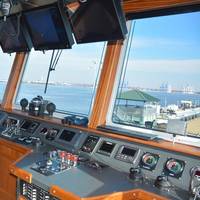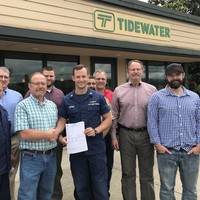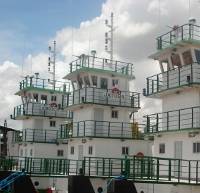New Routines on the Bridge in the Digital World

Like every sector of cargo and passenger shipping, “digitalization”—where computerized processes are replacing onboard routines previously handled manually— is an ongoing trend coastwise, on the waterways and harbors. Regulatory compliance, especially with Subchapter M for towing vessels, has also driven choices of onboard equipment with digital interfaces to software and online platforms for record-keeping and for generating inputs for forms and documents.Improved performance has also shaped the capabilities of equipment in the wheelhouse and the view from the bridge.
Work‘bots’: Autonomous Vessels Arrive
The near-shore and inland workboat fleet is at the leading edge for autonomous vessel developmentWhile the advent of autonomous workboats are not exactly mainstream, you better believe that in the not-too-distant future they will be a reality on waterways in and around the U.S. Today there remain more questions than answers, particularly on the legal, logistics and insurance side of the coin. But the technology is evolving at record pace, providing many in the industry with mixed emotions. Excitement. Controversy. Curiosity. Skepticism. These are just a few of thoughts, and emotions that arise to any mention of the topic of autonomous vessels.It’s happening now.
The ABB Electric Tow Boat Beckons to Inland Operators
Long a staple for offshore service providers, a more compact and carefully designed version of the diesel electric option is now available for inland pushboats. For budget conscious operators (and who isn’t, in this environment?), the stars may finally be aligned.For many years, electric propulsion has proven to be a viable propulsion solution for many different types of vessels. Most familiar to workboat stakeholders would be the advent of the ‘diesel electric’ offshore serve providers (OSV) that became commonplace during the offshore boom era. Those vessels operated in a different regulatory environment, with the emphasis more leaning towards operational efficiencies and fuel economy.
Tidewater Attains First Sub M COI on the West Coast

Tidewater Transportation and Terminals of Vancouver, Wash., announced today that the Office of Commercial Vessel Compliance and the Coast Guard Sector Columbia River has issued a Certificate of Inspection (COI) to the towing vessel Crown Point for compliance under the U.S. Coast Guard’s (USCG) Subchapter M safety regulations governing the inspection, standards and safety management systems of towing vessels.This COI is the first issued to a west coast (PACAREA) tugboat/towboat operator.The Crown Point is the first of three custom-built river towboats built for Tidewater in 2015.
Marquette Transportation Reportedly for Sale
Marquette Transportation Company LLC, a U.S. towboat operator, is exploring a sale that could value it at more than $1 billion and has attracted the interest of Dell Inc Chief Executive Officer Michael Dell, according to people familiar with the matter. Marquette's owners, that include its founders and buyout firm KRG Capital Partners LLC, are working with investment bank Harris Williams & Co on an auction for the company that is already underway, the people said this week. Private equity firms and family offices are vying for Marquette, including MSD Capital LP, the private investment firm of Michael Dell and his family, the people added. Marquette has annual earnings before interest, tax, depreciation and amortization of close to $150 million, the people said.
How to Work with Your Insurer When Experiencing a Loss
Marine insurance – just like health, automobile and homeowner’s insurance – can be a valuable safeguard in case something unexpected happens. And when something bad happens, it provides reassurance that you have assistance in place to help get back to business quickly. In the maritime industry, there is a high likelihood that your businesses will experience a loss at some point. Vessels run aground, cargo containers get damaged, and fires occur in shipyards. These are just some of the types of situations that can – and do – happen routinely to maritime owners and operators. Knowing these risks exist, you should ask yourself two questions to make sure your business is prepared: First, what can I do to mitigate the risk of loss before an incident occurs?
Coast Guard Suspends Search for Towboat Operator
The U.S. Coast Guard suspended its search 8:15 p.m. Wednesday for a 34-year-old tow boat operator who went missing Tuesday morning after the Coast Guard received a distress alert from an emergency position indicating radio beacon near Great Egg Harbor. Missing is David McAuliffe. The 45-foot Sea Tow boat Cape Hatteras departed Absecon Inlet at approximately 7:45 a.m. Tuesday en route to Great Egg Harbor, according to the boat's owner. Three hours later, Coast Guard watchstanders received an EPIRB activation alert. The operator aboard the Cape Hatteras did not respond to cell phone or radio calls. The Coast Guard searched more than 400 square miles, for 65 combined asset hours. "We are deeply saddened by the difficult decision to suspend our search efforts for Capt.
Pushboats for the Amazon

Transdorada Transportes LTDA, a towboat operator on Brazil’s Amazon River, has recently taken delivery of a number of Cummins-powered push boats. These include two 64-ft boats with twin Cummins KTA19-M3 engines each delivering 600 HP and a single 64-ft pushboat with a single KTA19-M3 engine. All three vessels were built at Estaleiro Rio Maguari. The boats will operate on the Amazon River between Belem and Manaus with the 1200 hp twin engined boats pushing six to nine barges and the 600 hp single-screw vessel pushing four barges at a time.
Study Analyzes Reduction of Downstreaming Incidents
In fleeting operations, a towboat operator will frequently perform a maneuver known as "downstreaming," which involves positioning the boat above the fleet, then moving downstream with the current to land on a barge and remove it from the fleet. Typically, downstreaming is a common procedure and normally performed without incident. However, in the past, the maneuver has resulted in a number of vessel sinkings and crew fatalities. A Quality Action Team (QAT) consisting of USCG representatives, as well as representatives from the Southern Region Quality Steering Committee of the American Waterways Operators (AWO), was formed to study the problem and make recommendations for reducing incidents stemming from downstreaming.
TOWBOAT TECH: Tougher, Kinder and more Hospitable
The design challenge for towboats in the new Millennium is they are being called upon to do tougher jobs on the water but at the same time have be more environmentally friendly to the water on which they sail. Also, many of today's towboats are light years ahead of their predecessors of just a few years ago in crew amenities and berthing spaces. "Much of the new technology we are seeing on towboats is because of new IMO, EPA, OSHA and ABS regulations," said Terry Boffone, president of Progressive Barge Line, Westwego, La. Progressive's business is mid-streaming fueling, so careful delivery of the products they carry such as diesel fuel and gasoline from the tank barge to the ship is critical.
"What Your Lawyer Will Tell You After a Barge Breakaway"
Under the general maritime law, a vessel owner has a duty to furnish a seaworthy vessel. A seaworthy vessel is one which is reasonably fit to carry the cargo it has undertaken to transport. II. Initially, a towboat operator has a duty to properly moor the barges it delivers, and breach of that duty imposes liability on the party delivering a vessel to the fleeter. When a towboat moors an unmanned barge or barges and those barges drift away from their moorings within a short time thereafter, there is a presumption of fault against the mooring vessel which shifts the burden of proof to the mooring vessel to show that it exercised due care. III. A terminal operator's duty to exercise reasonable care includes periodically inspecting barges in its custody.







